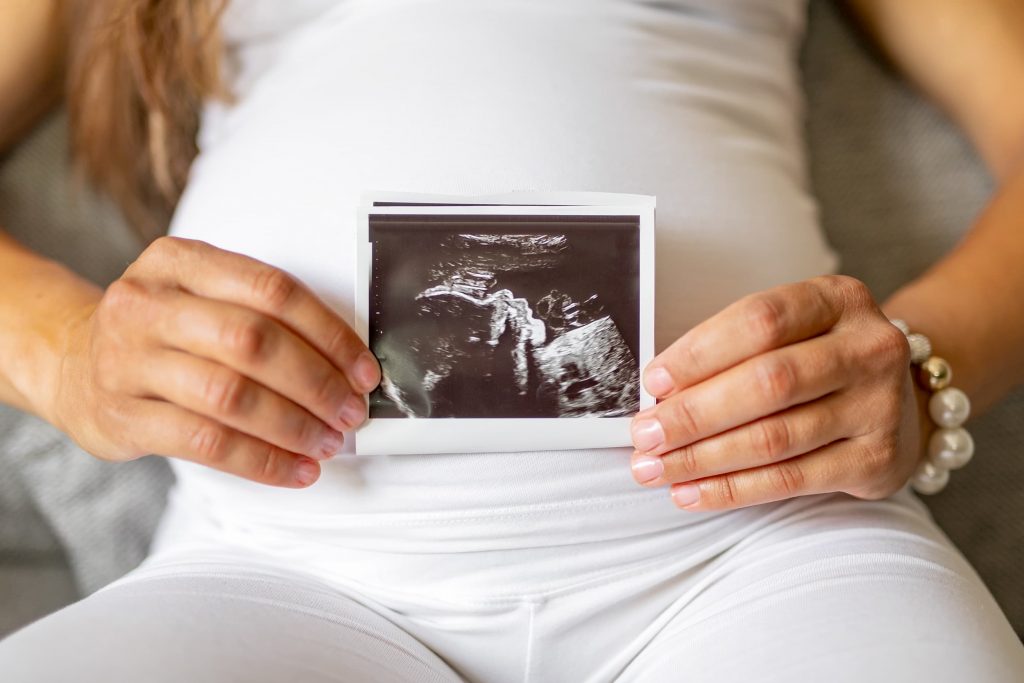Third Trimester: Week 28 to 40
As you approach the third trimester of pregnancy, your baby’s development is rapid and it’s common to experience aches and pains as the weight you’re carrying increases.
You might soon begin to feel the urge to ‘nest’ and get everything ready for the new addition to your family. It can be an incredibly exciting time, but also a frustrating one if you’re like most mums who can’t wait to meet their baby. It’s also perfectly natural to feel nervous about labour.
Your baby’s development during the
third trimester
In the third and final trimester your baby will triple in weight. Although not quite ready to greet the world just yet, your baby is now almost fully formed with well-developed organs that will continue to mature until birth.
Your baby’s senses are developing; their eyes are capable of seeing and registering the world around them and they can taste, touch and recognize your voice.
By the time you’re 34 weeks pregnant, your baby is putting on weight in the form of fat to help them regulate their body temperature and to keep them warm after birth. Their bones are continuing to harden at this stage too. You should continue to eat a wide variety of healthy foods to support you both.
By the 37th week, your baby is considered full-term because they’re so big now, you’ll feel even their smallest movements inside you. As their birth approaches, it’s important to maintain your balanced diet, making sure you get enough nutrients like calcium, which is also important while breastfeeding.
What should I eat and avoid during
the third trimester?
As their birth approaches, it’s important to maintain your balanced diet, making sure you get enough nutrients.
Getting into good habits now will make it easier to continue eating the nutrients your baby needs once you start breastfeeding.
To support your baby’s healthy development, a healthy & complete diet is essential:
- Long chain polyunsaturated fatty acids (LCPs) are types of omega-3 fatty acids. They are essential for the healthy growth and development of your baby’s brain and eyes. They are especially important during the last three months of pregnancy, when your baby’s brain really starts to grow. LCPs may be associated with improved visual and brain development in infancy, which is why LCPs continue to be important postnatally. After your baby is born, you will be able to pass these nutrients on through your breastmilk, which naturally contains LCPs, although the levels will vary depending on your diet, so try to keep up your LCPs stores with the right foods. The main sources of omega-3 LCPs are fresh, oily fish, like mackerel or sardines, so try to eat two portions each week. It’s not recommended that you eat more than this as these fish can contain pollutants, like mercury. Fish oil supplements are also not advised in pregnancy as they can contain high levels of vitamin A which could be unsafe for your developing baby.
- Although feeling breathless is common at this stage, shortness of breath can also be a sign of anaemia. Anaemia is caused by a deficiency in iron and you’re more likely to develop it during pregnancy. It’s treated simply by adding extra sources of iron to your diet – through food or supplements. If you’re also feeling tired all the time this can be another sign of anaemia, so speak to your doctor.
You can read more iron and other the vitamins and minerals you need during pregnancy, and find out which foods contain the highest levels in our diet and nutrition section.
- Your growing bump may be putting extra pressure on your bladder at this stage, but it’s still important to drink enough water and stay hydrated.
- There’s no doubt that being heavily pregnant can be extremely tiring. You’re not only carrying the extra weight around, but your body is working to supply your baby with energy and nutrients. You’re bound to need a lot of energy.
- But with your baby taking up most of the space your stomach used to have, you may find that your appetite has reduced. If you don’t feel like eating large portions, try to graze on healthy snacks throughout the day and either side of your meals – this will ensure your baby and you are receiving a steady supply of energy.
Try these healthy, energy-filled snacks:
- Dip pieces of fruit into yogurt
- Add yogurt to a bowl of mixed fruit and cereal
- Dip pitta bread in hummus or salsa
- Take fresh fruit with you, or carry dried fruits in your handbag to snack on while you’re out and about.
Your health during the third trimester
Cramps, joint pain, heartburn and a weak bladder can make it difficult to sleep at this stage. Lying on your left side will release the pressure your baby may be putting on the main vein which circulates blood through our body, thus improving your circulation, digestion, kidney and liver function. Sleeping on your back can result in palpitations and even low blood pressure. Many mums sleep with extra pillows positioned between slightly bent knees, under the bump and behind the back for support. Try not to drink just before bedtime and remember to empty your bladder fully before you go to sleep.
If you’re feeling tired and overheated at the moment, it’s because your body is working harder to nurture your baby and support their extra weight – the more blood that your body circulates to both of you, the more calories needed and the warmer you become.
If you’re too hot, why not try some of these ideas to cool you down:
- Keep a gel mask in the fridge for those times when you’re resting
- Put your hands and wrists under cold running water to cool your blood down
- A cooling spray, mini-fan or water spritzer stashed in your handbag will refresh you when you’re out and about
- Drink lots of water – it’ll keep you cool and rehydrate the fluids you’ve lost through sweating.
Liquid gold
Although much of your focus at the moment may be on birth and meeting your baby, it won’t be long until you need to turn your attention to breastfeeding.
Your breastmilk is unique to you and your baby. It’s designed to support them from day one with a balanced combination of the nourishment they need including: carbohydrates, proteins, fats including LCPs (long chain polyunsaturated fats), nucleotides, prebiotics, vitamins, minerals and antibodies.
This complex substance will adapt to your baby’s needs as they grow, contributing to their ongoing development. Their nutrition will then be reliant on your own diet via your breast milk, so it’s important to maintain the healthy eating habits that have been beneficial throughout pregnancy.
Further Reading
Being pregnant and giving birth can both have a huge impact on you physically and emotionally.
You’ve reached your second trimester. For most mums it’s a real milestone because it’s around now that you’ll want to start announcing the news to your friends and family.




